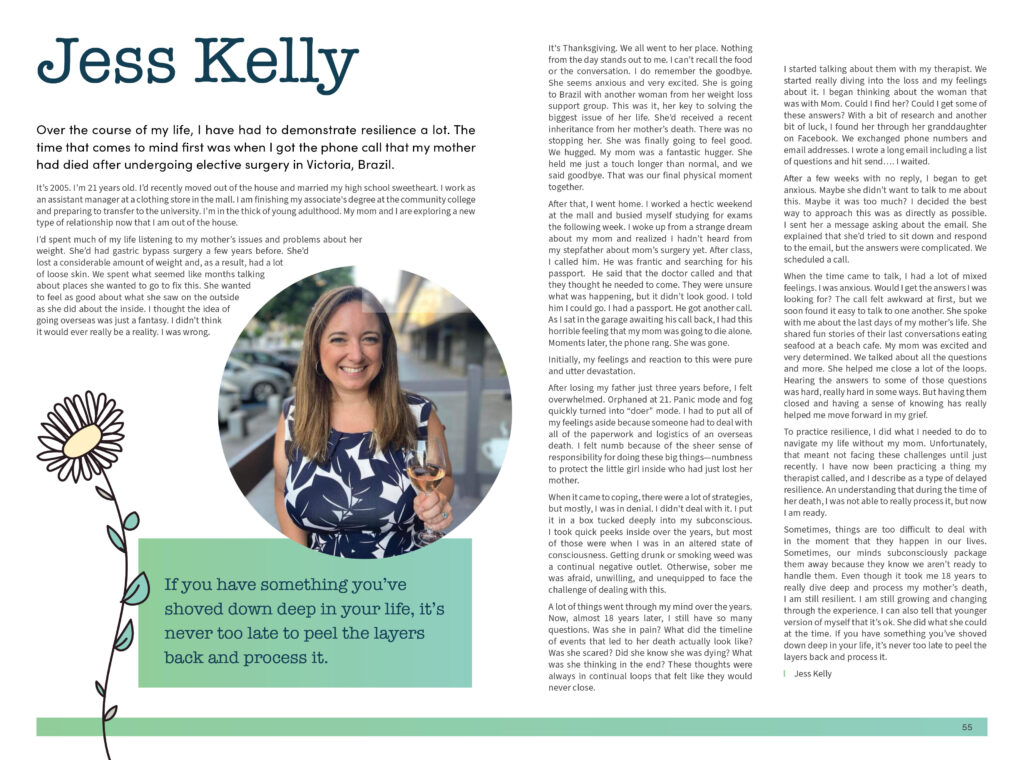Over the course of my life, I have had to demonstrate resilience a lot. The time that comes to mind first was when I got the phone call that my mother had died after undergoing elective surgery in Victoria, Brazil.
It’s 2005. I’m 21 years old. I’d recently moved out of the house and married my high school sweetheart. I work as an assistant manager at a clothing store in the mall. I am finishing my associate’s degree at the community college and preparing to transfer to the university. I’m in the thick of young adulthood. My mom and I are exploring a new type of relationship now that I am out of the house.
I’d spent much of my life listening to my mother’s issues and problems about her weight. She’d had gastric bypass surgery a few years before. She’d lost a considerable amount of weight and, as a result, had a lot of loose skin. We spent what seemed like months talking about places she wanted to go to fix this. She wanted to feel as good about what she saw on the outside as she did about the inside. I thought the idea of going overseas was just a fantasy. I didn’t think it would ever really be a reality. I was wrong.
It’s Thanksgiving. We all went to her place. Nothing from the day stands out to me. I can’t recall the food or the conversation. I do remember the goodbye. She seems anxious and very excited. She is going to Brazil with another woman from her weight loss support group. This was it, her key to solving the biggest issue of her life. She’d received a recent inheritance from her mother’s death. There was no stopping her. She was finally going to feel good. We hugged. My mom was a fantastic hugger. She held me just a touch longer than normal, and we said goodbye. That was our final physical moment together.
After that, I went home. I worked a hectic weekend at the mall and busied myself studying for exams the following week. I woke up from a strange dream about my mom and realized I hadn’t heard from my stepfather about mom’s surgery yet. After class, I called him. He was frantic and searching for his passport. He said that the doctor called and that they thought he needed to come. They were unsure what was happening, but it didn’t look good. I told him I could go. I had a passport. He got another call. As I sat in the garage awaiting his call back, I had this horrible feeling that my mom was going to die alone. Moments later, the phone rang. She was gone.
Initially, my feelings and reaction to this were pure and utter devastation.
After losing my father just three years before, I felt overwhelmed. Orphaned at 21. Panic mode and fog quickly turned into “doer” mode. I had to put all of my feelings aside because someone had to deal with all of the paperwork and logistics of an overseas death. I felt numb because of the sheer sense of responsibility for doing these big things—numbness to protect the little girl inside who had just lost her mother.
When it came to coping, there were a lot of strategies, but mostly, I was in denial. I didn’t deal with it. I put it in a box tucked deeply into my subconscious. I took quick peeks inside over the years, but most of those were when I was in an altered state of consciousness. Getting drunk or smoking weed was a continual negative outlet. Otherwise, sober me was afraid, unwilling, and unequipped to face the challenge of dealing with this.
A lot of things went through my mind over the years. Now, almost 18 years later, I still have so many questions. Was she in pain? What did the timeline of events that led to her death actually look like? Was she scared? Did she know she was dying? What was she thinking in the end? These thoughts were always in continual loops that felt like they would never close.
I started talking about them with my therapist. We started really diving into the loss and my feelings about it. I began thinking about the woman that was with Mom. Could I find her? Could I get some of these answers? With a bit of research and another bit of luck, I found her through her granddaughter on Facebook. We exchanged phone numbers and email addresses. I wrote a long email including a list of questions and hit send…. I waited.
After a few weeks with no reply, I began to get anxious. Maybe she didn’t want to talk to me about this. Maybe it was too much? I decided the best way to approach this was as directly as possible. I sent her a message asking about the email. She explained that she’d tried to sit down and respond to the email, but the answers were complicated. We scheduled a call.
When the time came to talk, I had a lot of mixed feelings. I was anxious. Would I get the answers I was looking for? The call felt awkward at first, but we soon found it easy to talk to one another. She spoke with me about the last days of my mother’s life. She shared fun stories of their last conversations eating seafood at a beach cafe. My mom was excited and very determined. We talked about all the questions and more. She helped me close a lot of the loops. Hearing the answers to some of those questions was hard, really hard in some ways. But having them closed and having a sense of knowing has really helped me move forward in my grief.
To practice resilience, I did what I needed to do to navigate my life without my mom. Unfortunately, that meant not facing these challenges until just recently. I have now been practicing a thing my therapist called, and I describe as a type of delayed resilience. An understanding that during the time of her death, I was not able to really process it, but now I am ready.
Sometimes, things are too difficult to deal with in the moment that they happen in our lives. Sometimes, our minds subconsciously package them away because they know we aren’t ready to handle them. Even though it took me 18 years to really dive deep and process my mother’s death, I am still resilient. I am still growing and changing through the experience. I can also tell that younger version of myself that it’s ok. She did what she could at the time. If you have something you’ve shoved down deep in your life, it’s never too late to peel the layers back and process it.

Are you ready to share your story of RESILIENCE? You can do that HERE.
